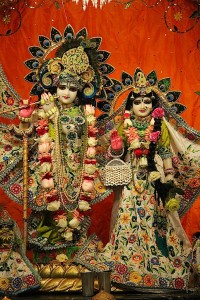I Was Sitting
I was sitting at a desk in an office on the main floor of our ashram when I noticed a young woman slowly moving about in curiosity. In the course of her browsing, our eyes met. I asked her, “Can I help you with something?”
“No, thank you, I’m just looking around.”
“Well, let me know if I can help you.”
“I will.”
About a minute had passed and this young woman came closer to the office door as I was engaged in desk work. She then said, “Actually, you can help. I do have a question,” as she stood by the door. As a monk I try to avoid being alone in a room with a woman, and I’ll also speak in a limited way. So I said, “Sure.”
“I was just wondering how I can deal with anger?” she asked.
“Yes, anger. We are all born with anger to a certain degree or another. If we look to the wisdom of the ancient text, Bhagavad Gita, we find that anger arises from attachment – attachment to either an object, or a position, a concept or an opinion. In general, when we are very obsessive about something, we can get angry. The only other time I see people get angry is when people don’t get enough sleep, and they get cranky like a baby (she laughed).
“I would suggest the next time the lava starts to boil in the volcano, before you say or do something, take a deep breath, become very thoughtful before you respond or react. Remain composed and controlled. Sometimes it helps to say nothing to avoid a confrontation. That would go a long way. Take refuge of the higher power (Krishna) and you can try thismantra: Hare Krishna Hare Krishna… and you ask for some strength. Instead of exploding and turning red, imagine the cooling blue of God. Believe it or not, looking at the sky will help. Just remember that anger blocks our sense of reasoning, so allow yourself to use your rationale before letting off steam. Try to recall the last time you got angry and how maybe you became violent, and then how it left hard feelings and maybe even destroyed a relationship. You’ll be amazed at how much you can process in a short amount of time when you give yourself that time before reacting.”
The young woman accepted the mantra card I gave her. She seemed very happy. “Please come again.”
“I will,” she said.
I did not tell her how walking can be of great service in handling anger. I do believe that I left her with the essentials, “Reach out for the mantra.”
May the Source be with you!
8 KM





 Indradyumna Swami: In December, 1970 Srila Prabhupada visited Surat, Gujarat for two weeks with 25 of his western disciples. Following in their illustrious footsteps we went on Ratha Yatra the very day we arrived in Surat. We could feel Srila Prabupada's mercy as we chanted and danced through the streets. We will have 5 festival programs in Surat; two in the same place Srila Prabhupada held his public lectures during his visit there. Our hearts are beating in great expectation! Srila Prabhupada ki jaya! [ Photos by Ananta Vrindavan dasa ]
Indradyumna Swami: In December, 1970 Srila Prabhupada visited Surat, Gujarat for two weeks with 25 of his western disciples. Following in their illustrious footsteps we went on Ratha Yatra the very day we arrived in Surat. We could feel Srila Prabupada's mercy as we chanted and danced through the streets. We will have 5 festival programs in Surat; two in the same place Srila Prabhupada held his public lectures during his visit there. Our hearts are beating in great expectation! Srila Prabhupada ki jaya! [ Photos by Ananta Vrindavan dasa ]  Wonderful historical events by an expert narrator!
Wonderful historical events by an expert narrator! 














 Deity Worship at Home Temple
Deity Worship at Home Temple  Sandi: Please watch and send out this video far and wide, it will surely inspire devotees around the world. It always got me out on Harinama (whenever I was dithering)!
Sandi: Please watch and send out this video far and wide, it will surely inspire devotees around the world. It always got me out on Harinama (whenever I was dithering)! 